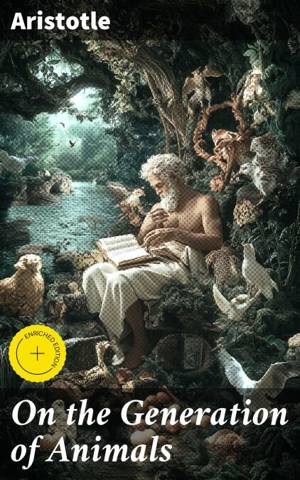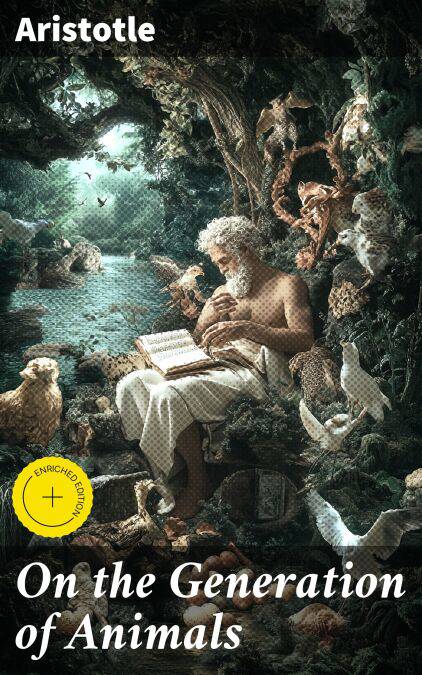
Bedankt voor het vertrouwen het afgelopen jaar! Om jou te bedanken bieden we GRATIS verzending (in België) aan op alles gedurende de hele maand januari.
- Afhalen na 1 uur in een winkel met voorraad
- In januari gratis thuislevering in België
- Ruim aanbod met 7 miljoen producten
Bedankt voor het vertrouwen het afgelopen jaar! Om jou te bedanken bieden we GRATIS verzending (in België) aan op alles gedurende de hele maand januari.
- Afhalen na 1 uur in een winkel met voorraad
- In januari gratis thuislevering in België
- Ruim aanbod met 7 miljoen producten
Zoeken
On the Generation of Animals E-BOOK
Enriched edition. Exploring the Intricacies of Animal Generation and Growth
Aristotle
E-book | Engels
€ 1,99
+ 1 punten
Omschrijving
In "On the Generation of Animals," Aristotle delivers a profound exploration of reproductive processes and the development of life forms, intertwining empirical observation with philosophical inquiry. Employing a systematic and analytical literary style, Aristotle meticulously categorizes various modes of generation, from oviparity to viviparity, and delves into the roles of form and matter in the essence of living beings. This work not only contributes to the natural sciences but also reflects the Aristotelian commitment to categorization and causation, emblematic of his broader philosophical paradigm, bridging metaphysics and biological observation in a way that would influence generations of thinkers. Aristotle, a towering figure of ancient Greek philosophy, was shaped by his unique experiences as a student of Plato and later as a teacher at the Lyceum. His extensive studies of nature, ethics, and metaphysics led him to investigate the biological underpinnings of life. "On the Generation of Animals" stands as a testament to his dedication to observing the natural world with rigor, driven by an insatiable curiosity that highlighted the interplay of biology and philosophy throughout his life. This foundational text is essential for modern readers who seek to understand the origins of biological thought and the evolution of scientific inquiry. It intricately reveals Aristotle's innovative approach, inviting readers to appreciate the depth of his observations and their lasting impact on both philosophy and biology, making it a must-read for anyone interested in the intersections of life, science, and thought.
In this enriched edition, we have carefully created added value for your reading experience:
- A succinct Introduction situates the work's timeless appeal and themes.
- The Synopsis outlines the central plot, highlighting key developments without spoiling critical twists.
- A detailed Historical Context immerses you in the era's events and influences that shaped the writing.
- An Author Biography reveals milestones in the author's life, illuminating the personal insights behind the text.
- A thorough Analysis dissects symbols, motifs, and character arcs to unearth underlying meanings.
- Reflection questions prompt you to engage personally with the work's messages, connecting them to modern life.
- Hand‐picked Memorable Quotes shine a spotlight on moments of literary brilliance.
- Interactive footnotes clarify unusual references, historical allusions, and archaic phrases for an effortless, more informed read.
In this enriched edition, we have carefully created added value for your reading experience:
- A succinct Introduction situates the work's timeless appeal and themes.
- The Synopsis outlines the central plot, highlighting key developments without spoiling critical twists.
- A detailed Historical Context immerses you in the era's events and influences that shaped the writing.
- An Author Biography reveals milestones in the author's life, illuminating the personal insights behind the text.
- A thorough Analysis dissects symbols, motifs, and character arcs to unearth underlying meanings.
- Reflection questions prompt you to engage personally with the work's messages, connecting them to modern life.
- Hand‐picked Memorable Quotes shine a spotlight on moments of literary brilliance.
- Interactive footnotes clarify unusual references, historical allusions, and archaic phrases for an effortless, more informed read.
Specificaties
Betrokkenen
- Auteur(s):
- Vertaler(s):
- Uitgeverij:
Inhoud
- Aantal bladzijden:
- 164
- Taal:
- Engels
Eigenschappen
- Productcode (EAN):
- 4064066464431
- Verschijningsdatum:
- 9/04/2021
- Uitvoering:
- E-book
- Beveiligd met:
- Digital watermarking
- Formaat:
- ePub

Alleen bij Standaard Boekhandel
+ 1 punten op je klantenkaart van Standaard Boekhandel
Beoordelingen
We publiceren alleen reviews die voldoen aan de voorwaarden voor reviews. Bekijk onze voorwaarden voor reviews.









